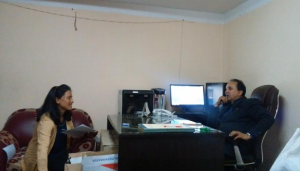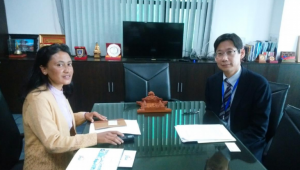マダガスカル・アンカラファンツィカ国立公園における保全政策と地域住民の生業活動(2018年度)
対象とする問題の概要 植民地時代にアフリカ各地で設立された自然保護区のコンセプトは、地域住民を排除し、動植物の保護を優先する「要塞型保全」であった。近年、そのような自然保護に対し、地域住民が保全政策に参加する「住民参加型保全」のアプローチ…

Interview with Dr. Khadga K.C., Professor of International Relations and
Diplomacy, Faculty of Humanities and Social Sciences, Tribhuvan University –
Nepal-Japan Relations Expert
It has become important to understand foreign policy, diplomacy, and diplomatic practices to enhance state’s international relations with the third wave of globalization and technological revolution. Diplomacy is now a key mechanism for balancing the various national interests of one country (J. Baylis, S. Smith & P. Owens 2017). In earlier eras, diplomacy existed and evolved with the changing dynamics of the international arena. Therefore, diplomacy has been adapted as a tool to ensure foreign policy goals. Nepal has had diplomatic relations with its immediate neighbor for centuries, but with a changing political system, diplomatic practices have also changed significantly, which is to be studied now. With this basic backdrop of the relationship between international relations and diplomacy, this study will focus on the diplomatic practices of Nepal, with reference to the Nepal-Japan relationship. Nepal’s relations with Japan began long before any official contact. The people of Japan and Nepal established links and friendships a century ago[1] and this continues today at both the governmental and personal levels, guided by goodwill, mutual understanding and respect. Therefore, it is essential now to view Nepal-Japan relations from up close. Thus, this research will compare two distinct political systems and time periods, wherein the research concentrates on the regime types. The study will first, analyze the diplomacy adapted during the Panchayat regime[2] and then the diplomacy adapted in the post-1990 regime.
[1] Since 1899, when Ekai Kawaguchi, the first Japanese monk, set foot in Nepal on the way to Tibet, then eight Nepali students came to Japan for their higher studies in 1902, and only after a long informal relationship, formal diplomatic relations were established on Sepetember1, 1956.
[2] It is the political system/period of Nepal which ranges from 1960-1990 to absolute monarchy.
The purpose of this research is to find out in which era public diplomacy was more effective, between the two time frames (1960s-1990s and post-1990) in the context of Nepal-Japan relations. Its purpose is also to identify the different actors in strengthening the bilateral and diplomatic relation between Nepal and Japan. These observations will be used to obtain a clear picture of the Japanese Official Assistance (ODA) to Nepal and its role in the process of the development partnership with Nepal.

Interview with Mr. Jun SAKUMA, Chief Representative of JICA, Nepal
Office
I visited Nepal from February 2 to March 19, 2018. First, in-depth interview was conducted with Nepal-Japan experts such as former ambassadors of Nepal to Japan, former foreign ministers, journalists, academicians, diplomats, and so on using a set of questionnaires developed in the context of diplomatic dimensions such as old diplomacy, new diplomacy, and public/citizen diplomacy, the three dimensions prioritized to derive the results. Second, necessary information and documents were collected from different places like the Embassy of Japan, Japan International Cooperation Agency (JICA), Nepal, Ministry of Foreign Affairs, Government of Nepal, Ministry of Finance Government of Nepal, and Central Library of Tribhuvan University (TU).
After interviewing different people, I found that the Nepal-Japan relationship was very good during the Panchayat era. Public diplomacy was more effective. Individuals and the monarchy were the key actors to strengthen Nepal-Japan relations during that period. Post 1990, various factors like political instability, conflicts, petitions for refugee status, abolishment of monarchy, and a new regime have slowed down Nepal-Japan bilateral and diplomatic relations. I collected some recent quantitative data on Japan’s ODA to Nepal, which will help to analyze the developmental partnership trend policy under the different political systems and periods in Nepal.
Based on the results of this preliminary research activity, the researcher would like to explore Nepalese society in Japan and Japanese societies in Nepal in further detail. For this, I have plan to go on field and collect more data and information from the Japanese Embassy, different Japanese citizens, related associations in Nepal, and Nepal- related associations in Japan. The interviewees responses will be analyzed to explore and understand the diplomatic practices of Nepal from 1960 to date, with reference to Nepal-Japan relations. The pre-doctoral paper will be based on a thematic analysis.
【1】J. Baylis, S. Steve Smith & P. Owens (Eds) (2014). “The Globalization of World Politics: An Introduction to International Relations”. (2nd International edition). United Kingdom: Oxford University Press.
Copyright © 附属次世代型アジア・アフリカ教育研究センター All Rights Reserved.